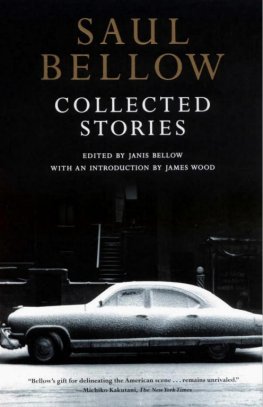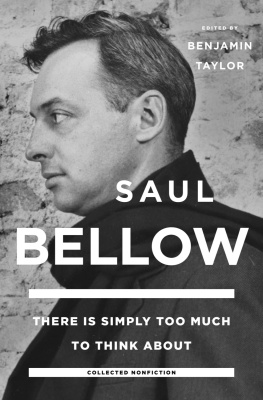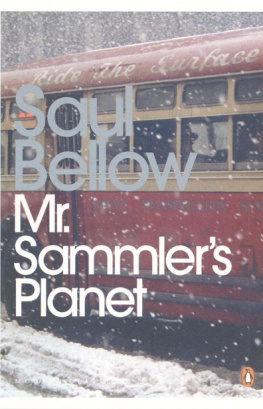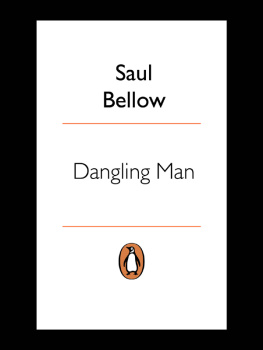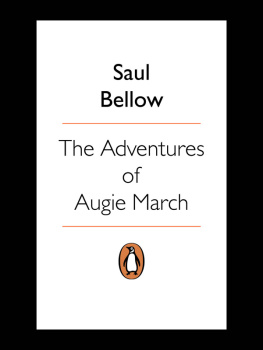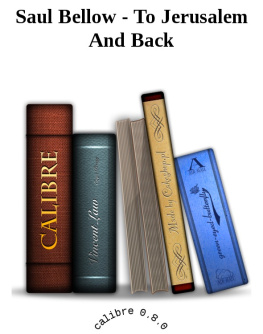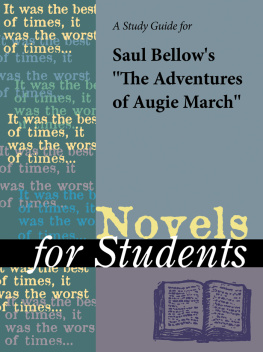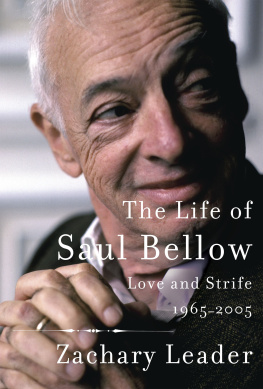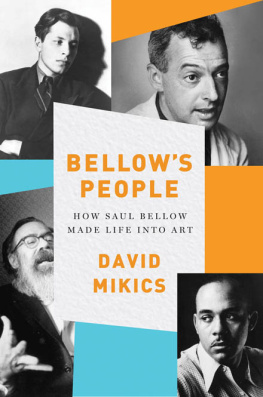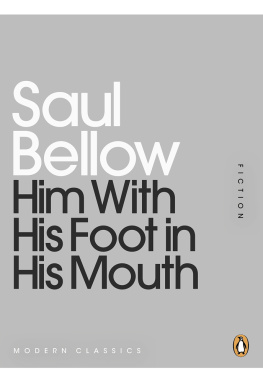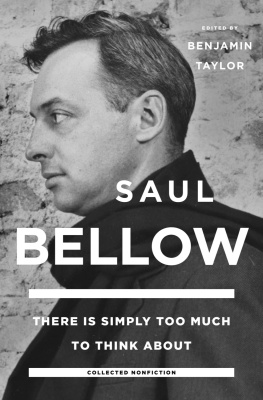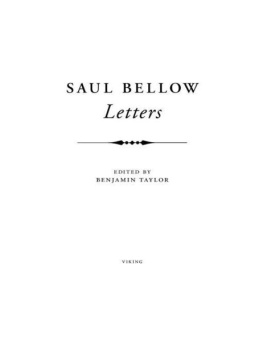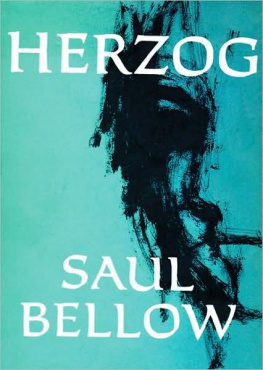Saul Bellow
COLLECTED STORIES
To Beena Kamlani, whose kindly function is to face me in the right direction. Her respectful and grateful author.
S. B.
Yesterday my husband and I took our year-old daughter, Naomi Rose, for a stroll in the neighborhood. The weather was ferociously coldwhat the forecasters in these parts unaccountably describe as blustery. To escape the icy wind we headed for the Brookline Booksmith. Now when Saul ducks into a bookstore, chances are hes going to be there for some time. I pulled Rosie out of her snowsuit and attempted to distract her with the dust jacket of Ravelstein. Whos this, Naomi Rose? Whos the man in the picture? And turning to point at Saul, she answered in that bell-like infant voice of hers that could be heard all through the store, Dad, dad, dad. Now Dad was muffled in turtle fleece to the eyebrows, but his face emerged to give her a most delicious smile.
This morning, as I begin to write, I imagine Rosie the reader, a couple of decades deeper into the century. When Rosie is ready for Sauls books, what memories will there be of Dad at his desk? And does memory need an assist? Will someone produce an accurate portrait of her father at work? Why not begin, I ask myself, with this little preface? To say for Rosies sake, and for scores of others who will never see the man sitting down to writethis is how it was done.
Proximity has been my privilege. I was there, for instance, when The Bellarosa Connection was born.
It began innocently enough. In the first week of May 1988 en route from Chicago to Vermont we stopped in Philadelphia, where Saul gave a lecture, A Jewish Writer in America, for the Jewish Publication Society. In the weeks before he delivered this talk, and for the remainder of that monthduring the drive from Philadelphia to Vermont; while exploring Dartmouth, where he was a visiting lecturer; and later in Vermont; where we were doing battle with the blackflies to lay in a gardenour conversation was about nothing but the fate of the Jews in the twentieth century. Just then Saul was facing the final revisions on A Theft, and he was wrestling with A Case of Lovea novel he would never finish. Meanwhile, he was waiting to hear whether A Theft had been accepted by The New Yorker. Both Esquire and the Atlantic Monthly had already decided the story was too long. It wasnt in Saul to mope alone by the telephone. Every morning over breakfast he diverted me with puns or entertained me with possible subjects for stories, and often he came downstairs to say that he had dreamed up a new way to jump-start A Case of Love. Why not introduce an eccentric Parisian pianist of the old school who would teach his heroine about love? We were reading and rereading the proofs of A Theft. Saul habitually revises well beyond the last moment. The ending wasnt righttoo many ideas, not enough movement. He would rework it by day and each night I would type and retype the latest pages. In the middle of May we got word that The New Yorker had also turned down his story, but Saul was too busy to be checked by bad news. He was reflecting deeply on what should come next, and the weather wasnt being cooperative. Now I ought to explain that Saul is extremely weather-sensitive. High-pressure azure skiesthose of late May and early Junehave always turned him on. But in that spring of88 the gloomy rain fell day after day. Saul would light a fire in the kitchen, drink his coffee, and then slosh out to the studio through the blackfly-infested soppy grass. He wasnt writing, he told me; he was going there to brood. And he added, Thats how Ive always done thingsyou separate yourself from editors, lawyers, publishers. You set down your burdens and you brood.
Our Vermont friends and neighbors Herb and Libby Hillman, looking to lift our sagging spirits, invited us to dinner. Over Libbys homemade bread and roast chicken, the conversation turned once again to the Jewish question, and Saul introduced an idea we had been debating since his Philadelphia lecture. Should the Jews feel shame over the Holocaust? Is there a particular disgrace in being victimized? I was ferociously opposed to this suggestion. As we awaited dessert we let go of the argument. The smell of chocolate announced that the drowsy end of the evening was upon us. Serious subjects gave way to gags, jokes, old chestnuts. But as we were getting ready to leave, our host, a retired chemist specializing in house paints, began to tell the story of one of his colleagues. This man, now dying of lung cancer after a lifetime of exposure to toxins, had been a European refugee in the early forties. I have to admit: while I was scraping the last of the chocolate from my plate, my mind was already on the rain and the slippery ride home. I was not attending as closely as I might have been.
May 24: The first fine day of the season. When Saul came back from the studio for lunch he had that shining-eyed look that made me anticipate his announcement: Im on to something new. I dont want to talk about it just yet. Next day as we were driving into Brattleboro for our weekly supplies, he elaborated: I havent found a shape for the new story yet, but its based on what Herb told us over dinner. Did I remember the details? No. But fortunately, Saul did: A refugee is imprisoned by the Italian Fascists, but prior to his imprisonment, having become aware that his arrest is imminent, he has written overseas to the Broadway impresario Billy Rose on the advice of a friend. (In the story as Saul eventually wrote it, the hero makes no such appeal to Billy Rose and in fact has never even heard of him.) A mysterious plan is concocted while he waits in his prison cell. He learns that his door will be left open at a certain hour on a certain night. Someone will meet him in the street behind the prison and indicate that he has been sent by Billy Rose. There will be money and instructions about which city to go to until the next contact appears. All happens as planned, and with the aid of these emissaries he escapes to the States. There, he is denied entry because of the quotas, but makes it to Cuba. Years later when he is back in the United States he tries to contact Billy Rose and to thank him in person. But it seems Rose, who has helped a lot of people, will have nothing to do with the refugees he has saved, perhaps fearing that they will lean on him or mooch from him indefinitely. The rescued man is quite shaken by the cold shoulder he gets from Broadway Billy.
Such were the bare bones of the story, as sketched by Saul that day on the way to town, a story no longer about Herbs friend, but already about a characterHarry FonsteinSurviving Harry, as Saul would later call him, borrowing from John Berrymans Dreamsong (dedicated to Saul) about Surviving Henry. Saul, it turned out, knew quite a lot about Billy Rose. For in his Greenwich Village days he had known Bernie Wolfe, who was Roses ghostwriter. A Wolfe-like character might become the intermediary between Rose and the protagonist. Wolfe had been a very bright, very savvy and strange man who took an unusual interest in New York people and their obscure motivations. Such a man would be sympathetic to the Fonstein character. Saul then told me a story about going to Wolfes place in the Village and noticing an old, worn woman dusting and scrubbing the apartment. On Sauls way out Wolfe turned to him and said, That lady is my mother. He hadnt introduced her or paid her any heed. Why make the confession then? Oh, people had ideas about being open in those Village days, Saul added. They prized their singularity. At that time they worried a great deal about their mental health. What a contrast such low-level American antics would provide to the somber seriousness of the European story.
Saul had also seen Billy Rose in Jerusalem. What did he look like? I asked. Well, he was small, Jewish; he might have been handsome but for the tense lines in his face. He looked strained, greedy, dissatisfied with himself.

